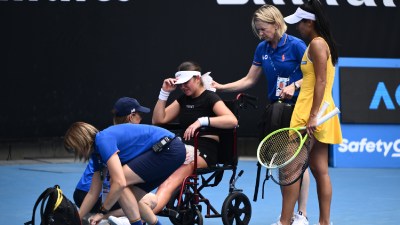Regime fodder
Tahsin glanced uneasily over his shoulder, a well-practiced habit in Saddam Hussein8217;s Iraq. A fugitive, he hurried along an alley near ...

Tahsin glanced uneasily over his shoulder, a well-practiced habit in Saddam Hussein8217;s Iraq. A fugitive, he hurried along an alley near the barber shop where he worked, less than a mile from US troops patrolling his neighbourhood. Settling nervously into a car, he recounted his story as a soldier in Saddam8217;s Fidayeen. 8216;8216;I was sure I was going to die,8217;8217; he said.
In a week of fighting, he went from Baghdad to Tikrit to Kirkuk and then back to the capital, barrelling through the north with dozens of others aboard blue buses of the Iraqi soccer team. Struggling against hopelessness and fear, he prepared for battle under the scrutiny of the militia8217;s swordsmen, appointed to decapitate any deserters. He weathered bombing and boredom. Then he asked himself: 8216;8216;For what am I going to fight?8217;8217;
Founded in 1995, Fidayeen8217;s membership numbered perhaps 25,000, with headquarters in Baghdad. Fidayeen fighters pledged absolute fealty to Hussein. For years, the Fidayeen under Uday was the long arm of a ruling clique that traditionally viewed the loyalty of its military with suspicion.
Fidayeen militiamen received salaries twice as large as government employees 8212; and those willing to carry out suicide attacks received far bigger rewards. Even more important were the under-the-table connections that brought perks of power and reinforced loyalty.
The militia recruited many young men like Tahsin, destitute and desperate. Five years ago, his family left the poor neighbourhood of Sayidiya for the poorer suburb of Abu Chir, even farther out in the capital8217;s sprawl. Twenty-three people lived in four rooms, among them Tahsin8217;s 11 brothers and sisters. He was the youngest or, as he put it, 8216;8216;I8217;m the last grave.8217;8217;
Tahsin said he joined the Fidayeen after he flunked out of high school in 2001. Facing the prospect of military service, he chose the militia instead. In return, they allowed him to continue his education in a party-run high school.
From 8 am to 2 pm, he reported for training at a camp in the district. One month of the year, he had to perform guard duties at night. For two more months, he had to undergo what the militia called special forces training.
Much of it, he said, was rudimentary: hand-to-hand combat, crawling under barbed wire and training with Kalashnikovs. Some was intimidating: a jump from a 100-foot-high bridge into the Tigris that left some recruits with broken bones or dead.
With war approaching, Fidayeen fighters were told that their call to arms was a song that would be broadcast three times, every half hour. Its refrain said, 8216;8216;The spearhead appeared glimmering between the hills.8217;8217; For Tahsin, the call came at midnight on March 17. He made it to the camp. Their ranks filled up. Foot soldiers wore black; those willing to undertake suicide attacks dressed in white.
Talking to me on Saturday, Tahsin looked nervous. 8216;8216;I8217;m scared of the Americans,8217;8217; he said. He paused, then smiled, giving voice to the widespread sense in Baghdad that Hussein8217;s government may be only hiding. 8216;8216;I don8217;t want to anger Uday, either,8217;8217; he said, only half-jokingly. That fear led him to answer the call to fight the Americans. 8216;8216;I was forced to go. If I refused, they would execute me,8217;8217; he said.
After gathering with other militiamen, Tahsin and his group moved across Iraq, changing locations nearly every day. Tahsin sensed they were looking for a fight. But they were lightly armed, he said, with little more than rifles and rocket-propelled grenades. In the week of roaming through northern Iraq, they faced only bombing, and not all that accurate. They never encountered US ground forces. 8216;8216;We didn8217;t see a tank, thank God,8217;8217; Tahsin said.
In Kirkuk and Tikrit, they left behind groups of 25 from the 100 that set out. Each group, he said, was joined by men he called 8216;8216;swordsmen8217;8217;. They were dressed in red shoes with a red belt, carrying three-foot-long swords, each with a gray wood handle. Their orders were to decapitate anyone who fled, and a swordsman was specially assigned to the group8217;s commander.
It was in Kirkuk that Tahsin made his decision to desert. His superiors had nominated him to become a suicide bomber, to throw his body on a tank. That was more than he had bargained for, he said. 8216;8216;I was willing to fight with a gun, but not to commit suicide,8217;8217; he said.
He returned to Baghdad with his group, reporting to the People8217;s Stadium. With a guard, he was sent to fetch water. He told the guard he was going to buy cigarettes, went around the corner and then ran, past the stadium and past the Baath Party militiamen in the streets.
He changed in a house in the neighbourhood of Zayuna, leaving behind his black uniform and rifle, made a quick call to his parents, then caught a taxi. He went as far as he could 8212; three hours to Mandali, a city northeast of Baghdad on the Iranian border, where his maternal aunt lived.
He returned on Friday when he thought it was safe. Now, Tahsin8217;s priorities are simple. School, and then 8216;8216;a good life8217;8217;. 8216;8216;I wish for a car. I want an apartment. When I get an apartment, I hope I can get a wife,8217;8217; he said. Nothing more? 8216;8216;That8217;s it,8217;8217; he said.
- 01
- 02
- 03
- 04
- 05































